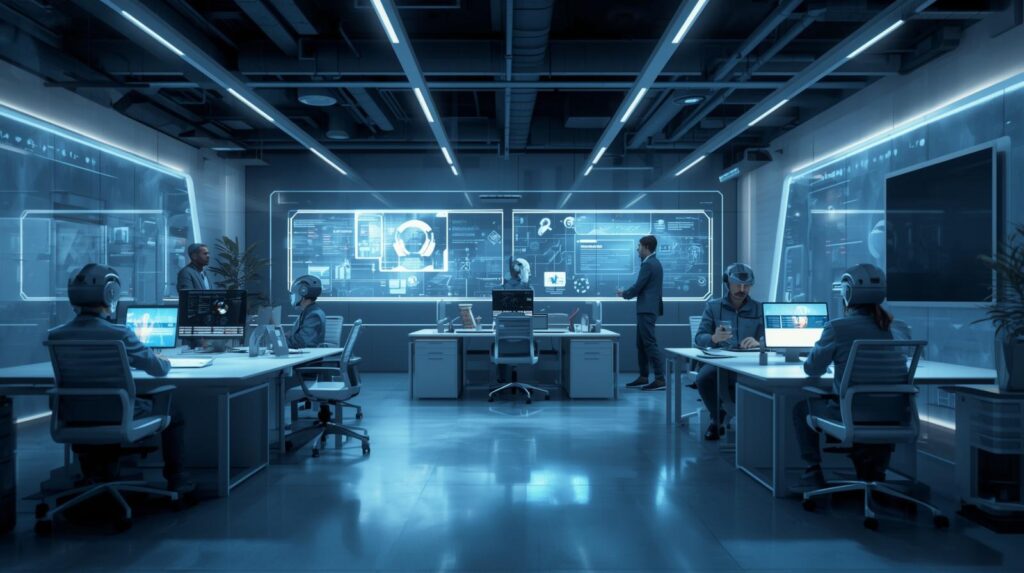
Remember the Last Time Your Laptop Froze Before a Big Meeting?
I still remember one morning in 2023 when my laptop decided to update itself—right before a client presentation. Panic. Coffee spilled. That sinking feeling we all know too well. IT support saved me that day, but not without a few frantic calls and a long wait in the queue.
Fast forward to 2025, things is changing. IT support is no longer just about “fixing stuff.” It’s becoming predictive, AI-powered, and surprisingly… more human. So, what does the future of IT support really look like?
Let’s dive in.
What Is the Future of IT Support?
The future of IT support is a blend of AI-driven automation and human empathy. Machines handle repetitive troubleshooting, while humans bring creativity, judgment, and emotional intelligence to complex cases.
In short:
- AI solves problems faster.
- Automation reduces downtime.
- Human experts handle the gray areas machines can’t.
Think of it like this: AI is your super-efficient assistant, but the human IT professional is still the trusted guide who knows when to break the rules.
Why Is IT Support Evolving So Quickly?
Technology is moving at lightning speed. Businesses can’t afford long downtimes, and employees expect instant help. At the same time, cyber threats are more sophisticated, and remote work has blurred the lines of traditional IT help desks.
Key drivers include:
- AI and Machine Learning – Smart bots learn from past issues and resolve them faster each time.
- Cloud-Based Systems – Support is no longer tied to physical offices.
- Remote Work Culture – Employees need support from anywhere, anytime.
- Cybersecurity Threats – IT support must now defend, not just repair.
The Role of AI in IT Support
Smarter Chatbots & Virtual Agents
No more clunky “press 1 for support” systems.
AI-powered chatbots in 2025 can:
- Diagnose issues in seconds.
- Provide step-by-step fixes.
- Escalate to human agents only when needed.
- Predictive Maintenance
Instead of waiting for something to break, AI predicts failures before they happen. Your system might notify IT: “Hard drive health is declining. Replace within 30 days.”
24/7 Availability
- AI never sleeps. Whether it’s 2 PM or 2 AM, your team can get answers instantly.
- Where Automation Fits In
- Automation handles the repetitive, time-consuming tasks that once clogged IT teams.
For example:
- Password resets (yes, the most common support request).
- System updates and patches.
- Onboarding new employees with pre-configured setups.
This frees human IT pros to focus on higher-value work—like strategy, training, and solving tricky, unique problems.
But Don’t Count Humans Out. Here’s the thing: people still trust people. A client once told me, “I like the chatbot, but I feel calmer when a real person says, ‘Don’t worry, I’ve got this.’”
Humans bring:
- Empathy: Understanding the frustration of a crashed system.
- Judgment: Knowing when to override automation.
- Creativity: Designing custom solutions no AI can predict.
- The future of IT support isn’t AI versus humans. It’s AI and humans, working together.
Common Questions About the Future of IT Support
Q: Will AI replace IT support jobs?
Not entirely. AI will automate repetitive tasks, but humans will still handle complex troubleshooting, strategy, and emotional support.
Q: How will IT support look in 2030?
Expect hyper-personalized, proactive support—where issues are resolved before you even notice them—plus stronger cybersecurity integration.
Q: Is automation safe for sensitive IT tasks?
Yes, as long as it’s combined with human oversight and strict security protocols.
The Skills IT Professionals Need in 2025
If you’re in IT support (or want to be), here’s what to focus on:
- AI Literacy – Learn how AI tools work, not just how to use them.
- Cybersecurity Awareness – Every IT pro is now partly a security officer.
- Soft Skills – Communication, patience, and empathy matter more than ever.
- Problem-Solving Mindset – Think creatively when automation falls short.
- Adaptability – Tech changes fast; curiosity keeps you relevant.
- Real-World Example: Hybrid IT Support in Action
A mid-sized company recently shifted to a hybrid IT support model:
- AI chatbots incoming requests.
- Automated scripts fixed routine issues (updates, resets, basic installs).
- Human experts were available for escalations and employee training.
Result? Response time dropped by 40%, employee satisfaction scores went up, and IT staff finally had time to focus on innovation instead of constant firefighting.
If you manage a team or company, here’s how to prepare for the future of IT support:
- Invest in AI Tools Wisely – Don’t chase trends; pick solutions that fit your business size and culture.
- Keep the Human Element – Make sure employees still have access to real people.
- Train Continuously – Encourage IT staff to learn AI, cybersecurity, and soft skills.
- Balance Speed with Security – Faster isn’t always better if it compromises safety.
- Gather Feedback – Ask employees how they feel about the support they receive.
Final Thoughts: The Future Is Human-Centered Tech
Here’s the truth: AI and automation are changing IT support forever. But at the end of the day, technology is only as good as the people behind it. The future of IT support is faster, smarter, and yes—more automated. But it’s also more human, because empathy, reassurance, and creativity can’t be programmed.
If you’re an IT professional, lean into learning. If you’re a business leader, build systems that balance tech efficiency with human warmth. Because the companies that win in 2025 (and beyond) won’t be the ones with the fanciest tools. They’ll be the ones that remember: support is about people.

Leave a Reply